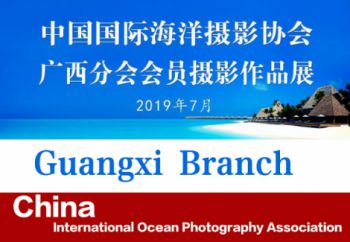海洋振兴一次深刻的民族精神的觉醒——孟昭澄访谈
发布时间:2021-04-26 11:43:35 作者:办公室 阅读量:2104
Ocean revitalizes a profound national spirit awakening
——Interview with Meng Zhaocheng

孟昭澄
海军政治部宣传部原副部长,海军大校军衔。现任世界华侨华人社团联合总会副秘书长、中国海洋网顾问、中国和谐网顾问、中国海洋摄影协会名誉会长、中国民族管弦乐学会荣誉理事、中国国际健康美容行业联合会总顾问、北京郑和与海洋文化研究会副理事长、高占祥研究会副会长、北京市冬泳俱乐部主席、《蓝色星球》杂志社名誉社长,先后在军内外多家刊物担任编委、顾问和中央数字电视书画频道副总编,2010年11 月应邀担任《首届中国女性书画摄影大赛》组委会执行副秘书长和评审委员会主任。
中国是真正意义上的内陆大国,几千年的文明其实是黄土文化。中国人对于自己无法把握的广阔海洋是畏惧的。历代皇帝称自己为“坐拥江山”, 对海很少提及,也许是一种畏惧海洋的心态在作怪。正因为自古以来对海洋的不够重视,才会出现禁海政策,以及后来的闭关锁国,致使我们一直处于落后挨打的被动局面。近代以来,中国一直被侵略、被掠夺,而欺辱我们国家的,正是以辉煌海洋文明著称的西方国家。当然,侵略抢夺不等于说他们的海洋文化和文明决定了他们的这种侵略行为, 这和民族历史背景等诸多复杂原因密切相关的。并且,要客观地说,在资源抢夺的过程中,国家间的文化也在一种被动的状态中进行了交流与融合。
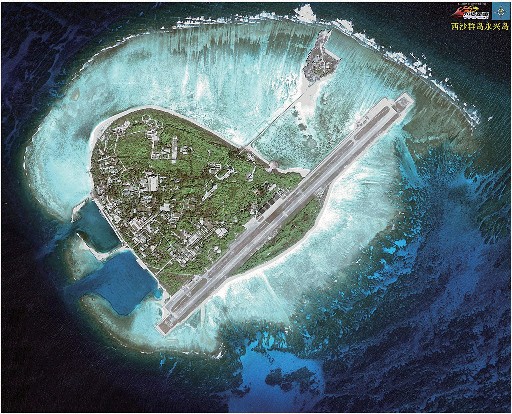
海洋文化的普及推广工作是非常重要的,首先,推广模式应该是大众喜闻乐见的形式,这样才能引起人们的了解和关注。如果不了解,更不会去关注。我个人认为,我们国家现在的海洋意识仍旧薄弱,有的人是漠视,但更多的人是忽视。举例来说,有的地方在出版地图的时候没有标明南海九条断续线。摊开中国正式出版的地图就不难发现, 在我国南海,从北部湾以南向海至台湾省东南端, 以国界线的表示方法标绘了九条断续的线,用以反映我国政府对外的一种权利主张,这就是我们常说的“九段线”,因其形状像英文字母“U”,所以也称其为“‘U’ 形线”;另外还有“岛屿归属线”、“历史性水域线”、“传统海疆线”等说法。我们现在所看到的九条断续线从形
成到发展至今经历了很多变化。“断续线”的发展变化,说明历届中国政府对南海管辖权和行政权的继承和行使。虽然新、旧“断续线”的各条线段有着空间位置上的差异,但无论新线还是旧线,所包围的岛、礁、滩、沙在范围上是一致的,显示出中国南海陆地领土主权范围的历史延续性。有的学者和政府官员,讲到我国的国土范围,也只笼统地提到东海之滨。
其次,海洋文化的宣传,必须是有目的的宣传,目标明确,才能有的放矢,掷地有声,才能获得良好的反响赢得社会公众的认可和获得其应有的地位,有了一定的社会地位才能有更多的作为。不久前,全国人大十一届四次会议批准通过了“十二五”“坚持陆海统筹,推进海洋经济发展”的规划纲要。这是中国政府首次在国民经济和社会发展规划中把海洋与陆地同等看待。要充分认识维护国家海洋权益的重要性,这不仅涉及国家的主权和民族的尊严,更涉及国家发展的实实在在的经济利益,事关国家可持续发展、中华民族伟大复兴的长远和根本利益。
海洋的开发和保护在一段时间内是必然充满矛盾的,但是以牺牲环境为代价进行的开发行为已经被证明是愚蠢的、不可持续的。每个国家的国土环境都具有局限性,所以,陆地上的环境破坏,有时候,可能是局部的,有限的。但是海洋不一样。从最近日本的核污染事件来看,海洋环境的维护攸关全人类的共同利益。所以对于海洋开发的立法必须严格,法律必须有一条明确的准绳进行约束。
今年世界海洋日暨全国海洋宣传日的主题非常好,有历史的鲜明特征。辛亥革命是中国民主革命的重要里程碑,把统治千年的封建王朝推翻,开启了一个新时代。正如今天,我们要振兴海洋,同样是要迎接一个新时代的到来。辛亥革命是一次民族精神的觉醒,而海洋开发、海洋经略也可以说是一次深刻的民族精神的觉醒。历史不会等待,中国应该抓住这次海洋振兴的机会,使国力更加强大。
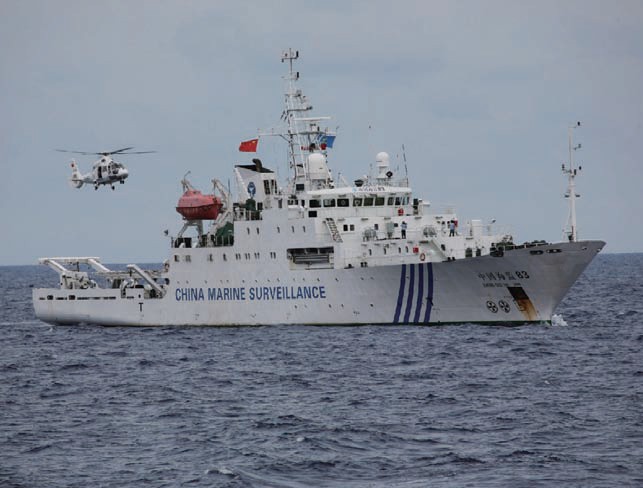
(采访/沈婷婷)
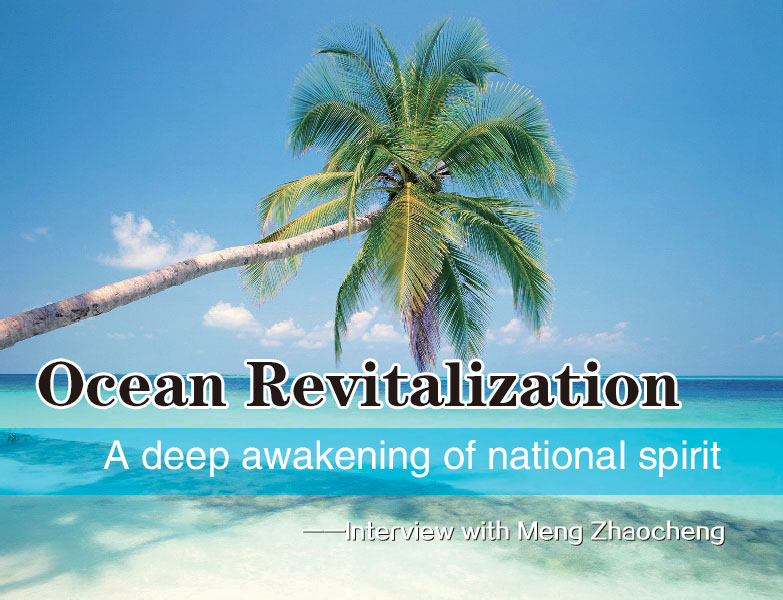
Meng Zhaocheng
Former Deputy Minister of the Propaganda Department of the Navy Political Department, the rank of Navy Colonel. Current Deputy Secretary-General of the World Federation of Overseas Chinese and Chinese Associations, Consultant of China Ocean Network, Consultant of China Harmony Network, Honorary President of China Ocean Photography Association, Honorary Director of China National Orchestral Society, General Counsel of China International Health and Beauty Industry Federation, Zheng He, Beijing With the vice chairman of the Marine Culture Research Association, the vice chairman of the Gao Zhanxiang Research Association, the chairman of the Beijing Winter Swimming Club, and the honorary president of the "Blue Planet" magazine, he has served as an editorial board, consultant, and CCTV painting and calligraphy for many publications inside and outside the military. Deputy Editor-in-Chief of the channel. In November 2010, he was invited to serve as the Executive Deputy Secretary-General and Director of the Review Committee of the Organizing Committee of the "First Chinese Women's Painting, Calligraphy and Photography Competition".
China is a big landlocked country in the true sense, and the civilization of thousands of years is actually the loess culture. The Chinese are afraid of the vast ocean they cannot grasp. The emperors of successive dynasties called themselves "sitting on the river and mountains", and rarely mentioned the sea, perhaps because of a mentality of fearing the sea. It is precisely because of the lack of attention to the ocean since ancient times that the policy of banning the sea and the subsequent closure of the country has caused us to remain in a passive situation of backwardness and beatings. Since modern times, China has been invaded and plundered, and it is the Western countries that are known for their glorious maritime civilization that insulted our country. Of course, aggression and snatching does not mean that their marine culture and civilization determine their aggressive behavior, which is closely related to the national historical background and many other complicated reasons. And, objectively speaking, in the process of resource grabbing, cultures between countries are also communicating and fusing in a passive state.
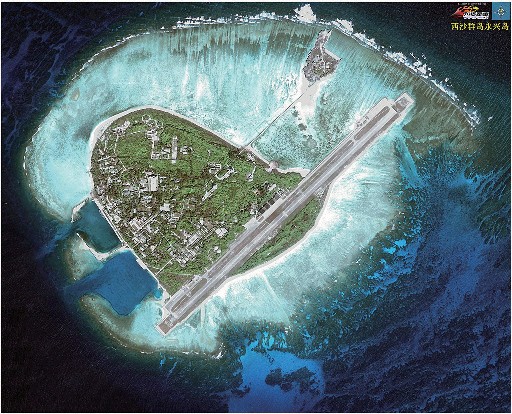
The popularization and promotion of marine culture is very important. First of all, the promotion mode should be a form that the public loves to see, so as to arouse people's understanding and attention. If you don’t understand, you won’t pay attention. I personally think that our country’s current ocean awareness is still weak. Some people ignore it, but more people ignore it. For example, some places did not indicate the nine intermittent lines in the South China Sea when the maps were published. It’s not difficult to find out on the map officially published in China. In the South China Sea, from the south of the Beibu Gulf to the southeastern tip of Taiwan Province, nine intermittent lines have been drawn in the form of national boundaries to reflect the foreign affairs of the Chinese government. This is what we often call the "nine-dash line". Because its shape is like the English letter "U", it is also called "'U'-shaped line"; there are also "island attribution lines" and " "Historic waters line", "traditional sea frontier line" and other terms. The nine intermittent lines we see now are from the shape.
It has undergone many changes since its development. The development and changes of the "intermittent line" illustrate the succession and exercise of the jurisdiction and administrative power of the South China Sea by the successive Chinese governments. Although the new and old "intermittent lines" have different spatial positions, the islands, reefs, beaches, and sands surrounded by the new line or the old line are the same in scope, showing the land of South China Sea The historical continuity of the scope of territorial sovereignty. Some scholars and government officials only mentioned the coast of the East China Sea in general when talking about the scope of our country.
Secondly, the propaganda of marine culture must be purposeful propaganda, with clear goals, in order to be targeted and vocal, in order to obtain a good response, win the recognition of the public and obtain its due status, and only with a certain social status can there be more The act. Not long ago, the Fourth Session of the Eleventh National People's Congress approved and passed the "Twelfth Five-Year Plan" "Insist on land and sea coordination and promote marine economic development" planning outline. This is the first time that the Chinese government has treated the ocean and land equally in its national economic and social development plan. It is necessary to fully understand the importance of safeguarding the country’s maritime rights and interests, which not only involves the sovereignty and national dignity of the country, but also the tangible economic interests of the country’s development and the long-term and fundamental interests of the country’s sustainable development and the great rejuvenation of the Chinese nation.
The development and protection of the ocean is bound to be full of contradictions for a period of time, but development at the expense of the environment has proven to be stupid and unsustainable. Each country’s territorial environment has its limitations. Therefore, environmental damage on land may sometimes be local and limited. But the ocean is different. Judging from the recent nuclear pollution incident in Japan, the maintenance of the marine environment is of vital importance to the common interests of all mankind. Therefore, the legislation for marine development must be strict, and the law must be bound by a clear criterion.
The theme of this year's World Ocean Day and National Ocean Promotion Day is very good, with distinctive historical characteristics. The Revolution of 1911 was an important milestone in China's democratic revolution. It overthrew the feudal dynasty that had ruled for thousands of years and ushered in a new era. Just as today, if we want to rejuvenate the ocean, we also want to welcome the arrival of a new era. The Revolution of 1911 was an awakening of the national spirit, and ocean development and ocean management can also be said to be a profound awakening of the national spirit. History will not wait. China should seize this opportunity to rejuvenate the ocean to make its national power stronger.
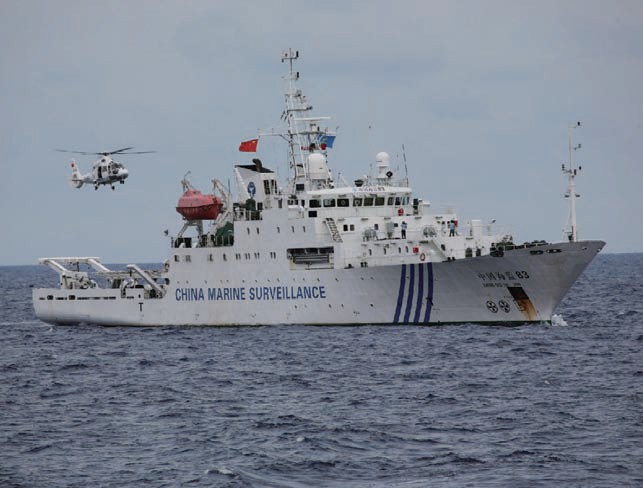
(Interview/Shen Tingting)


